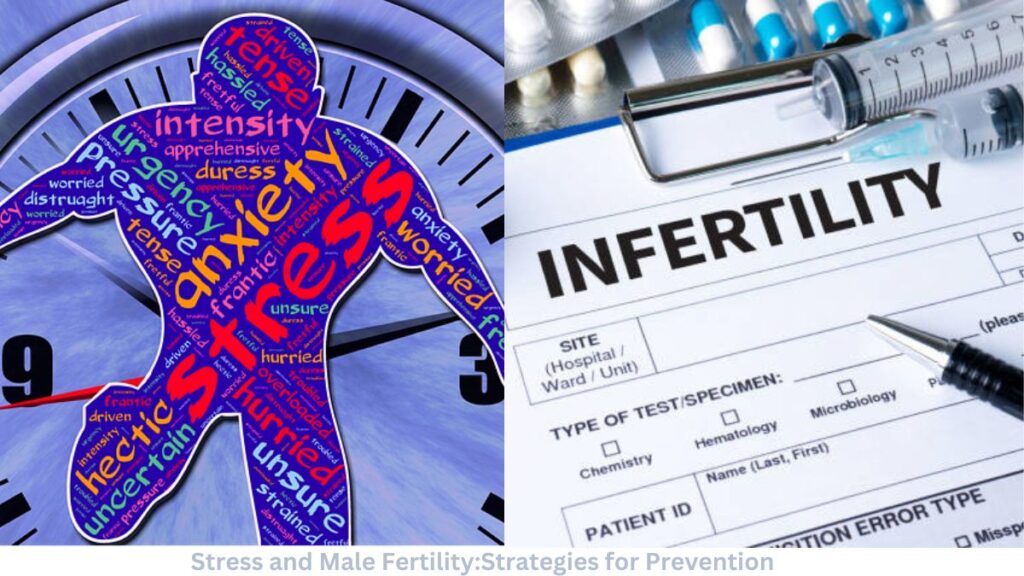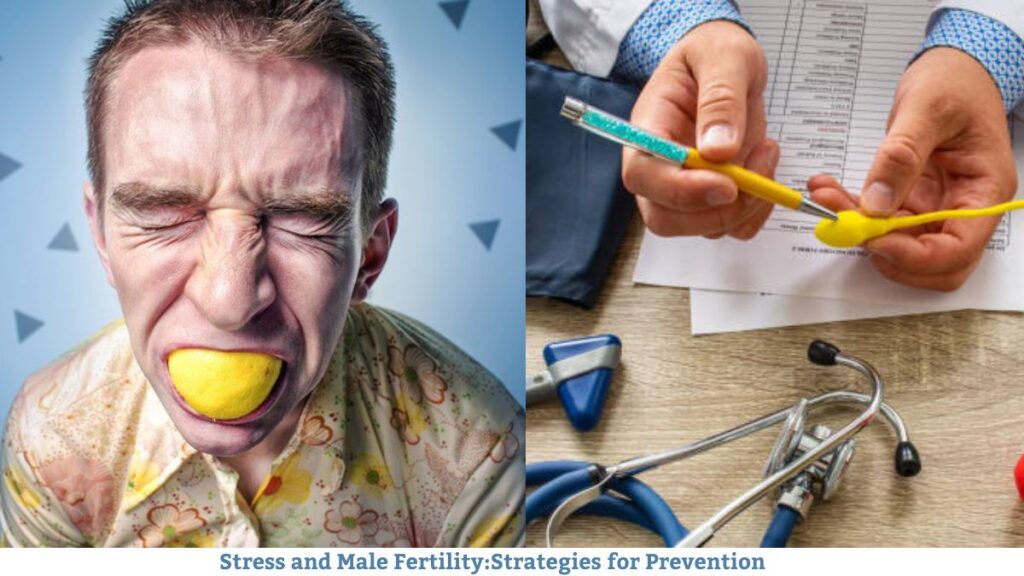INTRODUCTION:-
“The Hidden Threat: Stress and Male Fertility—Strategies for Prevention”

In today’s fast-paced world, stress has become an insidious threat to many aspects of health, including male fertility. While often overlooked, the impact of stress on reproductive health is profound and can lead to significant challenges for men hoping to conceive. Fortunately, there are proactive strategies individuals can adopt to mitigate this hidden threat and safeguard their fertility.
Understanding the Link between Stress and Male Fertility
Before delving into prevention strategies, it’s crucial to grasp the intricate connection between stress and male fertility. Stress triggers a cascade of physiological responses in the body, including the release of hormones like cortisol and adrenaline. These hormones, when chronically elevated due to ongoing stress, can disrupt the delicate balance of reproductive hormones, such as testosterone, luteinizing hormone (LH), and follicle-stimulating hormone (FSH).

Moreover, stress can impair sperm production and quality, leading to decreased sperm count, motility, and morphology. Additionally, high levels of stress have been associated with erectile dysfunction and decreased libido, further complicating the fertility picture for men.
Proven Strategies for Stress Management and Fertility Preservation
Fortunately, there are effective measures individuals can take to manage stress and protect their fertility:
- Prioritize Self-Care: Incorporate stress-relieving activities into your daily routine, such as exercise, meditation, deep breathing exercises, or yoga. These practices help reduce cortisol levels and promote relaxation, which can positively impact fertility.
- Maintain a Balanced Diet: Fuel your body with nutritious foods rich in antioxidants, vitamins, and minerals. A diet high in fruits, vegetables, lean proteins, and whole grains can support reproductive health and mitigate the negative effects of stress on fertility.
- Establish Healthy Sleep Habits: Prioritize adequate sleep, aiming for seven to nine hours per night. Poor sleep quality or insufficient sleep can exacerbate stress levels and disrupt hormonal balance, negatively affecting fertility.
- Foster Strong Social Connections: Cultivate supportive relationships with friends, family, or a therapist. Having a strong support system can provide emotional resilience and help buffer the effects of stress on fertility.
- Practice Mindfulness Techniques: Engage in mindfulness practices such as mindfulness-based stress reduction (MBSR) or cognitive-behavioral therapy (CBT). These techniques can help reframe negative thought patterns, reduce anxiety, and promote overall well-being.
- Limit Exposure to Stressors: Identify sources of stress in your life and take proactive steps to minimize or eliminate them where possible. Whether it’s adjusting workloads, setting boundaries, or seeking professional help, reducing stressors can have a profound impact on fertility.
Can heightened levels of anxiety contribute to erectile dysfunction and decreased libido in men?
Yes, heightened levels of anxiety can contribute to both erectile dysfunction (ED) and decreased libido in men. Anxiety can have a profound impact on sexual function and desire through various physiological and psychological mechanisms:
- Psychological Factors: Anxiety, particularly performance anxiety, can create a cycle of worry and negative thoughts related to sexual performance. This can lead to increased stress during sexual activity, making it difficult for men to achieve or maintain an erection. Anxiety can also cause a loss of confidence and self-esteem, further exacerbating sexual dysfunction.
- Physiological Responses: Anxiety triggers the body’s “fight or flight” response, leading to increased levels of stress hormones such as cortisol and adrenaline. These hormones can constrict blood vessels, including those in the penis, reducing blood flow to the genital area. Inadequate blood flow is a common cause of erectile dysfunction.
- Neurotransmitter Imbalance: Anxiety can disrupt the balance of neurotransmitters in the brain, including serotonin and dopamine, which play a role in regulating mood and sexual function. Imbalances in these neurotransmitters can contribute to decreased libido and sexual arousal.
- Relationship Dynamics: Anxiety can strain relationships and communication between partners, leading to decreased intimacy and sexual desire. Relationship stress can further exacerbate anxiety-related sexual dysfunction.
Overall, heightened levels of anxiety can have a significant impact on erectile function and libido in men. Addressing underlying anxiety issues through therapy, stress management techniques, and lifestyle changes can help alleviate symptoms of sexual dysfunction and improve overall well-being. Seeking support from a healthcare professional or therapist can be beneficial for individuals experiencing anxiety-related sexual concerns.
How do lifestyle factors influenced by stress, such as poor diet and lack of exercise, further exacerbate male reproductive health concerns?
Lifestyle factors influenced by stress, such as poor diet and lack of exercise, can exacerbate male reproductive health concerns through various pathways:

- Nutritional Deficiencies: Stress often leads to unhealthy eating habits, including the consumption of processed foods high in sugars, fats, and refined carbohydrates. A poor diet lacking in essential nutrients such as vitamins, minerals, and antioxidants can impair reproductive function by negatively impacting sperm quality and hormone balance.
- Obesity: Stress-induced overeating and unhealthy food choices can contribute to weight gain and obesity. Obesity is associated with hormonal imbalances, including decreased testosterone levels and increased estrogen levels, which can negatively affect sperm production and fertility. Additionally, obesity is linked to conditions such as insulin resistance and metabolic syndrome, which further impair reproductive health.
- Inflammation: Poor diet and lack of exercise can promote systemic inflammation, which is associated with oxidative stress and damage to sperm cells. Chronic inflammation in the reproductive organs can impair sperm quality and motility, increasing the risk of infertility.
- Sedentary Lifestyle: Chronic stress often leads to a sedentary lifestyle characterized by lack of physical activity. Regular exercise is essential for maintaining healthy hormone levels, promoting blood circulation, and reducing stress. A sedentary lifestyle can contribute to hormonal imbalances, decreased sperm quality, and increased risk of erectile dysfunction.
- Sleep Disturbances: Stress can disrupt sleep patterns, leading to sleep disturbances such as insomnia or poor sleep quality. Inadequate sleep is associated with decreased testosterone levels, impaired reproductive function, and reduced libido in men.
- Alcohol and Substance Abuse: Stress may drive individuals to cope through alcohol consumption or substance abuse, which can have detrimental effects on male reproductive health. Excessive alcohol intake and drug abuse can impair sperm production, decrease testosterone levels, and lead to erectile dysfunction and infertility.
Overall, lifestyle factors influenced by stress, including poor diet, lack of exercise, and unhealthy coping mechanisms, can significantly impact male reproductive health. Adopting a balanced diet, engaging in regular physical activity, managing stress effectively, and avoiding harmful substances are crucial for maintaining optimal reproductive function and fertility.
What proactive steps can men take in their daily lives to minimize stressors and safeguard their reproductive wellness?
Lifestyle factors influenced by stress, such as poor diet and lack of exercise, can exacerbate male reproductive health concerns in several ways:

- Nutritional Deficiencies: Chronic stress often leads to poor dietary choices, such as consuming high-fat, high-sugar foods that are low in essential nutrients. A diet lacking in vitamins, minerals, and antioxidants can impair sperm quality and overall reproductive function.
- Weight Gain and Obesity: Stress-related overeating and a sedentary lifestyle can contribute to weight gain and obesity, which are associated with hormonal imbalances and decreased fertility in men. Excess body fat can disrupt testosterone production and impair sperm quality.
- Increased Inflammation: Stress and unhealthy lifestyle habits can lead to chronic inflammation in the body, which is linked to various reproductive health issues, including sperm abnormalities and erectile dysfunction.
- Impaired Immune Function: Stress weakens the immune system, making individuals more susceptible to infections and illnesses. Certain infections, such as sexually transmitted infections (STIs), can directly impact male fertility and reproductive health.
- Altered Sleep Patterns: Chronic stress often disrupts sleep patterns, leading to sleep disturbances and insomnia. Inadequate sleep can negatively affect hormone levels, including testosterone, and impair reproductive function.
To minimize stressors and safeguard reproductive wellness, men can take proactive steps in their daily lives:
- Healthy Eating: Focus on consuming a balanced diet rich in fruits, vegetables, whole grains, lean proteins, and healthy fats. Nutrient-dense foods provide essential vitamins, minerals, and antioxidants that support reproductive health.
- Regular Exercise: Engage in regular physical activity, such as cardiovascular exercises, strength training, and yoga. Exercise helps reduce stress levels, improve blood circulation, and support overall well-being.
- Stress Management: Practice stress-reduction techniques, including mindfulness meditation, deep breathing exercises, progressive muscle relaxation, or yoga. Find activities that help alleviate stress and promote relaxation.
- Adequate Sleep: Prioritize quality sleep by establishing a regular sleep schedule, creating a relaxing bedtime routine, and optimizing sleep environment. Aim for 7-9 hours of uninterrupted sleep each night to support hormone balance and reproductive function.
- Limit Alcohol and Tobacco: Reduce or eliminate alcohol consumption and avoid tobacco products, as they can negatively impact sperm quality and reproductive health.
- Maintain a Healthy Weight: Strive to achieve and maintain a healthy weight through a balanced diet and regular exercise. Maintaining a healthy weight can help optimize hormone levels and improve fertility.
- Regular Health Check-ups: Schedule regular check-ups with a healthcare provider to monitor reproductive health, address any concerns, and receive appropriate screenings or treatments.
By adopting these proactive measures, men can minimize stressors, promote overall well-being, and safeguard their reproductive health and fertility.
CONCLUSION
By implementing these strategies, individuals can proactively manage stress and protect their fertility, paving the way for a healthier reproductive future. Remember, addressing stress not only benefits fertility but also enhances overall well-being and quality of life. Take control of your stress today and empower yourself to thrive—both mentally and reproductively.






